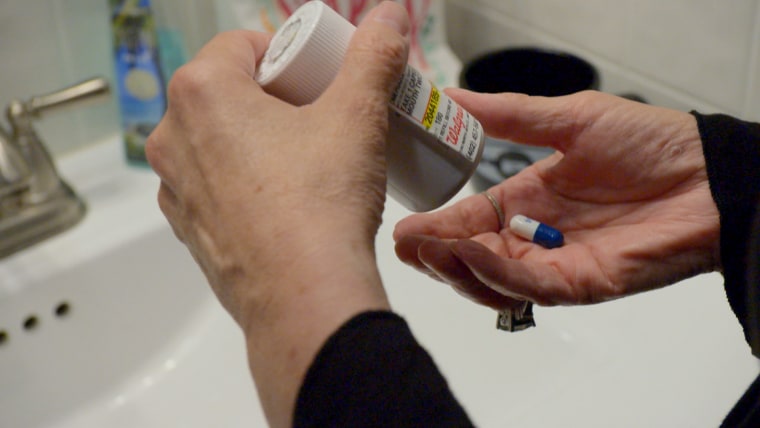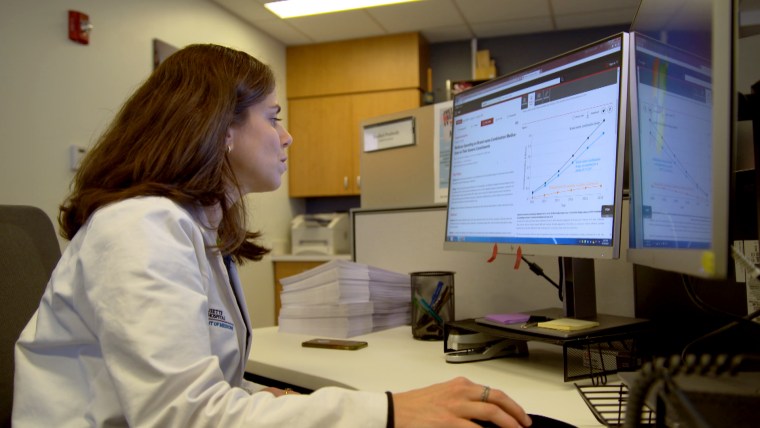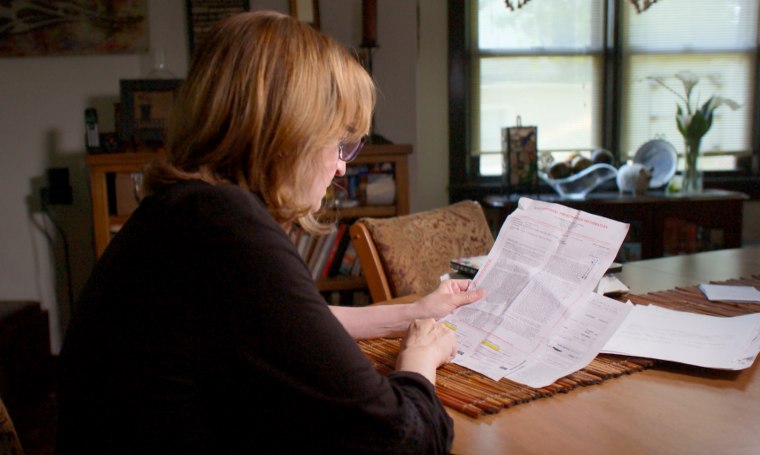OMAHA, Neb. — It's a price tag that would give anyone sticker shock: $14,213.99 for a 90-day supply of generic acid reflux medication.
But when Suzanne Luttig picks up the prescription for the drug, Zegerid, she pays only $24.
The catch? Luttig, a full-time professional photographer in Omaha, works an extra 25 hours a week at a bank primarily to help pay for the medication, which she says she cannot do without.
"Because I have health insurance with my employer, I am able to be covered for this medication," said Luttig, who provided NBC News with a receipt for her pharmacy medication. "I would not be able to get it if I didn't have insurance."
The price of her generic version of Zegerid, which is manufactured by Dr. Reddy's Laboratories, is significantly higher than the sum of the prices of its main ingredients: omeprazole and sodium bicarbonate. When bought separately, the two individual drugs would cost about $34 for her three-month supply with a coupon.
Zegerid is what's known as a combination drug — a medication that combines two or more existing drugs — into a single pill or product. While they are convenient for consumers, experts say the price tag of the products contributes to the high cost of health care in America.
"We're not talking about transformative new therapies," said Dr. Chana Sacks, an internist and medical researcher at Massachusetts General Hospital in Boston. "We're talking about very small tweaks to medicines that we have been using for these very reasons for years."
Sacks authored a 2018 study on the subject that found that brand-name combination drugs cost Medicare $925 million more in 2016 than their generic components.

In one example from the study, Merck's Fosamax Plus D had a list price of $39.05 per pill, while its generic components, Alendronate (used to prevent and treat certain types of bone loss) and vitamin D3, cost $1.25. And for Bausch Health Companies Inc., the manufacturer of Zegerid, the list price sits at $86.29 per pill, versus 47 cents for omeprazole (generic Prilosec) and sodium bicarbonate (baking soda).
But the stark difference in pricing goes largely unnoticed as consumers are drawn in by low copayments, some as little as $10. Meanwhile, physicians may also be unaware of a drug's cost, Sacks said.
"As a physician, I often don't know what the medications that I prescribe cost. And then when a patient goes to pick it up at the pharmacy, they only see what their copay is," she said.
"I think the fact that, from the time that a prescriber writes the prescription till the patient picks it up, nobody knows what the price tag is [is] hugely problematic."
Luttig said it wasn't until she was waiting for the insurance coverage from a new job to kick in that she realized how much her prescription was listed for.
"I asked the pharmacist, I said, 'Are you kidding me?'" she said. "And they said, 'No, we're not kidding you.' I went, 'OK. I don't think I'll get this refilled today.'"
"It's an abuse of the system," said Devon Herrick, a health economist and former hospital accountant who examined drug makers who reformulate over-the-counter drugs into expensive combination drugs.
"Their business model essentially involves gouging insurers and health plans, which ultimately costs consumers," he wrote in an analysis.

Herrick's analysis focused on two drugs made by Horizon Therapeutics, Duexis and Vimovo, and pointed out ways that companies prevent patients from experiencing sticker-shock, like offering coupons and working with specialty pharmacies.
Horizon outlines its strategy in financial filings, in which the company acknowledges concerns about pharmacists' substitutions of less expensive options.
"We have faced challenges due to pharmacists increasingly switching a patient's intended prescription from DUEXIS and VIMOVO to a generic or over-the-counter brand of their active ingredients," the company wrote in a 2016 filing with the Securities and Exchange Commission.
The company's solution? A financial assistance program called HorizonCares, which works with specific partner pharmacies to dispense the drugs and reduce patients' out-of-pocket costs.
"Part of our commercial strategy to increase adoption and access to our medicines in the face of these incentives to use generic alternatives is to offer physicians the opportunity to have patients fill prescriptions through independent pharmacies participating in our HorizonCares patient access program, including shipment of prescriptions to patients," the 2019 quarterly filing reads.
Herrick sees it as a way to work around pharmacies that might suggest less expensive options.
"If a drug company has to go around the local pharmacy and sign up independent pharmacies, it's a case of gaming the health care system," Herrick said. "They try to circumvent the local pharmacy from saying 'that's over the counter.'"
Programs like HorizonCares are a way companies can bypass incentives to buy the cheapest drug and sidestep the competitive process, Herrick said, adding: "It's a strategy we probably shouldn't tolerate as a society."
Horizon disputes the characterization. "The reality here is that our co-pay support programs help address payer attempts to prevent patients from receiving the medicine their doctor prescribed based on reasons other than clinical benefit," the company said in an email to NBC News. Horizon also points out that there is specific language in labeling approved by the Food and Drug Administration that cautions patients not to substitute other medicines for their prescribed medications.
Click here to read the full statement from Horizon Therapeutics
NBC News asked the FDA why it approved a label suggesting that patients not substitute the two generics for the combo drug and was told to make a request under the Freedom of Information Act. Two months later, NBC News received the documents: The FDA acknowledges that "the individual components of Duexis are readily available over-the-counter." An agency reviewer also notes that "the potential exists for the formulation to be dosed comitantly in place of Duexis." But in the end, the reviewer calls the label "reasonable," citing in part the fact that Duexis uses 26.6 mg of the stomach protectant famotidine. Over the counter, the commonly available strengths are 20 mg and 40 mg.
"Is that really innovation?" asks Sacks. "We're talking a couple of milligrams of a dose that no doctor that I know thinks is a clinically significant change. And I just bring it back to — at what cost?"
Sacks points out that if a patient takes the recommended dose of three pills a day of Duexis, she could get the same amount of stomach protectant by taking two over-the-counter meds of 40 mg each.
Matt Eyles, president and chief executive of the health insurance trade group America's Health Insurance Plans, said: "Drug prices are out of control, and millions of hard-working Americans feel the consequences every day. While new drugs may offer breakthrough cures, repackaging old over-the-counter or generic medications and charging unaffordable prices is not the kind of innovation Americans need."
When Horizon bought Vimovo from another drug maker, AstraZeneca, in 2013, the list price for the drug was $114, according to GoodRx, a drug-pricing website. Within weeks, according to a GoodRx analysis, the company raised the list price to $799. Six years and nine price hikes later, the list price is $2,482.
"I think we've long uncoupled the cost of R&D [research and development] being the reason for these price hikes," Sacks said. "I don't think there's any evidence to show that that's really the link in these prices."
In a 2014 SEC filing shortly after the acquisition, the company laid out its strategy to raise prices.
"Our strategy with respect to Vimovo included bringing its pricing in line with Duexis and thereby significantly increasing the value realized per prescription," reads the filing.
And the practice appears to have been effective. Beginning in 2014, the drugs have had the same periodic increases — a jump of more than 1,600 percent for both drugs over the years.
"We look at ... what the market will bear," Horizon President and Chief Executive Timothy Walbert said in a 2015 interview with CNBC when asked how the company was able to raise the price on acquired drugs like Vimovo when they are not changing the drug.
Walbert also said that the money from the price hikes helps them create access for patients who can't afford the drug.
Horizon told NBC News that these drugs, which provide pain relief and a stomach protectant in a single pill, provide better protection for patients at risk of gastrointestinal complications than taking the components separately.
In a statement, Horizon said out-of-pocket costs for 98 percent of all commercially insured patients are $10 or less. It also said the price it receives per prescription has been decreasing and was less than $300 in 2018.
But it adds up. According to SEC filings, from 2011 to 2018, the two drugs have brought in more than $1.3 billion for the company.
Meanwhile, for patients who have come to rely on the medications at low personal cost, there can be a snag down the line.
Mary Meyer, a medical assistant in the Chicago suburbs, said she was pleasantly surprised to hear about the possibility of a low copay for her prescription of Duexis.
"I'm like, that's awesome," Meyer said when she heard from a Horizon representative that a specialty pharmacy would charge her a copay of only $10 for the drug, which her doctor had prescribed to treat her flare-ups of lower back and hip pain.
But when Meyer turned 65 in December 2018 and switched from a commercial plan to Medicare, she learned that the government plan doesn't accept copayment coupons from manufacturers. So even after picking up a supplemental Medicare Part D plan to cover Duexis, she still finds herself unable to afford the $1,300 bill she said she was quoted for a 90-pill prescription at Walmart.
"Unless I win the lotto, I'm not paying it," she said.
For now, she is rationing the pills that are left in her last bottle.
"I have not picked up a prescription since I have been on Medicare," she said. "I take it as infrequently as possible."
Download the NBC News app for breaking news
As patients grapple with these issues, they can't really turn to the federal government.
"It's important to realize that the FDA, when it comes to drug pricing, really doesn't have a role in our current system," Chana Sacks said. "When the FDA is considering approval of a drug, cost is not part of the consideration."
In fact, the FDA states on its website that it has "no legal authority to investigate or control the prices."
While combination drugs go through an FDA approval process that evaluates a drug for safety and efficacy, critics say the process does not prove that the new drug is actually superior to its generic components.
Dr. Enrique Seoane-Vazquez, a professor at Chapman University's School of Pharmacy, co-authored a 2015 study documenting an increase in the number of FDA approvals of combination drugs over time. He claims there is a financial incentive to make the products available.
"The main reason is the profits the pharmaceuticals [companies] have from this and the low development costs," he said, adding that returns on investment can be higher than those for medications needing more research and development to produce.
Some physicians say they are unconvinced that there is a therapeutic difference between many single-pill combinations and their generic alternatives.
"Patients are paying more for something that is not necessarily more beneficial or safe," said Dr. Reshma Ramachandran, a family medicine doctor at the Kaiser Permanente Los Angeles Medical Center and a former research faculty member at the Johns Hopkins Bloomberg School of Public Health. At NBC News' request, Ramachandran reviewed the FDA approval packages for several brand name combination drugs and found no significant therapeutic difference from between the combination drugs and their generic components.
What's more, the FDA does not require the companies to prove a new drug is superior to existing drugs on the market. "My message to the companies is if the drugs are truly effective, prove it, show they are superior," said Ramachandran, who also leads the Drug Affordability Action Team at Doctors for America, a physician advocacy group that lobbies for access to affordable, quality health care.
"Approving drugs which fail to show true therapeutic benefit and giving them the designation of being a 'new drug application' means that our healthcare system is setting a low bar for which is truly novel," she wrote in an email to NBC News. "This is incentivizing companies to not invest in true innovation that will truly help our patients, but instead on low-hanging fruit ... that they then heavily market to patients and providers."
She said that is especially true when it comes to Zegerid. Upon reviewing the approval package for the capsule version of the drug, Ramachandran said she does not see any added benefits to prescribing it and cannot justify the price to her patients.
Meanwhile, the list price for 30 capsules of 40 mg/1100 mg brand name Zegerid has gone from $101.10 in 2007 to $3,306.82, the GoodRx analysis shows.
When asked about the drug's price and therapeutic difference from its component medications, a representative for Bausch Health said it "is unable to provide a comment at this time."
Dr. Reddy's Laboratories, the manufacturer of Luttig's generic Zegerid, told NBC News that it "cannot comment on the prices that consumers pay for drugs at the pharmacy." The drug company also said medication costs are determined by "many factors," including a person's prescription drug or medical plan.
The maker of brand name Zegerid declined to comment.
The lack of answers has baffled consumers like Luttig.
"I don't understand why, when you have Prilosec, which is a reasonable over-the-counter drug, and baking soda, and you put those two together, why does it, all of a sudden, become $14,000? I don't get it," she said. (Since NBC News began reporting this story several months ago, Luttig's insurer changed what it will cover, now reimbursing half the generic Zegerid it used to for Luttig's prescription.)
Sacks warns consumers to be vigilant about drug prices in America.
"In that absolute moment where you're standing at the pharmacy counter and you can afford that medication and it's not an issue, I can understand why it seems like those doesn't affect us," she said.
But she said: "These higher costs will be reflected in all of our premiums. The higher costs that we're paying today are going to be reflected tomorrow."
Jaime Longoria and Didi Martinez reported from New York.


